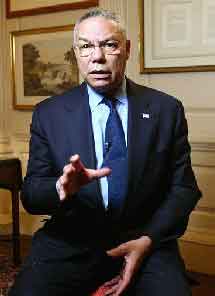Powell said he had told the Palestinian leader in their telephone conversation, "I expect him to be taking more aggressive steps" despite having some political problems. On other issues, Powell said: - He does not believe U.S. credibility has been damaged by the failure of U.S. and British teams to find any of the weapons of mass destruction that the Bush administration said Iraqi President Saddam Hussein had stockpiled. Powell stood by the U.S. claims. "This isn't a figment of someone's imagination," he said. "This isn't something that was overblown or made up in the basement of the CIA late one night. These were real weapons, real programs that Saddam Hussein refused to come forward and explain to the world." - He takes North Korea at its word that it has developed nuclear weapons but "we will not be frightened into taking action that would not be appropriate." The Bush administration seeks a diplomatic solution "and we feel confident that one can be found." - Russia, which the administration accuses of providing Iran with advanced technology for its reactor, appears to share U.S. concerns that Iran is developing nuclear weapons. After the International Atomic Energy Agency makes its assessment next week "we will make an assessment, consult with our friends who have an interest in this matter and then see what our next steps should be." - He agrees with Defense Secretary Donald H. Rumsfeld that a Belgian law that claims a right to prosecute war crimes committed anywhere makes it difficult for high-ranking U.S. officials to visit NATO headquarters in Brussels. "The Belgian government knows this is a problem," Powell said. "We are just saying to them ..., 'We hope you can find a solution to it because it does make it a bit awkward.'" Powell plans to meet in Jordan in about 10 days with leaders of Russia, the European Union and the United Nations on their joint effort to promote peacemaking between Israel and the Palestinians. In the AP interview, Powell left open the possibility of holding talks in Israel and with the Palestinians on the West Bank, as well. "I have some flexibility in my schedule, but I haven't made any decision yet," he said. "I'll decide when we get closer." His meeting in Jordan with U.N., Russian and European Union officials will be held at the end of a trip next week to Cambodia for an Asia conference and to Bangladesh. Amman, the capital of Jordan, is the likely site, State Department spokesman Richard Boucher said. Before telephoning Abbas and Sharon, Powell spoke by phone to Foreign Ministers Silvan Shalom of Israel, Ahmed Maher of Egypt, Saud al-Faisal of Saudi Arabia and Marwan Muasher of Jordan to appeal for help in stemming the violence in the region. At the Saudi Embassy, Adel al-Jubeir, a Saudi foreign policy adviser, said the kingdom was moving ahead to counter terrorism in the area. He said 1,000 suspects had been questioned, more than 300 arrested and almost 100 were awaiting trial. "Al-Qaida will find it increasingly difficult ot find safe haven inside Saudi Arabia," the Saudi official said. Powell plans to fly to Jordan from Bangladesh June 19 and while there attend the World Economic Forum at the Dead Sea city along with Robert Zoellick, the U.S. trade representative. It was in Jordan last week that President Bush reached agreement with Sharon and Abbas to proceed with the peacemaking blueprint that had been prepared jointly by the United States, the United Nations, the European Union and Russia. Powell will be joined in Jordan by U.N. Secretary-General Kofi Annan, Russian Foreign Minister Igor Ivanov and senior officials of the European Union. The informal group, known as the Quartet, called for an end to 33 months of conflict, establishment of a Palestinian state by 2005 and other measures designed to settle the long-standing Israeli-Palestinian conflict. |
